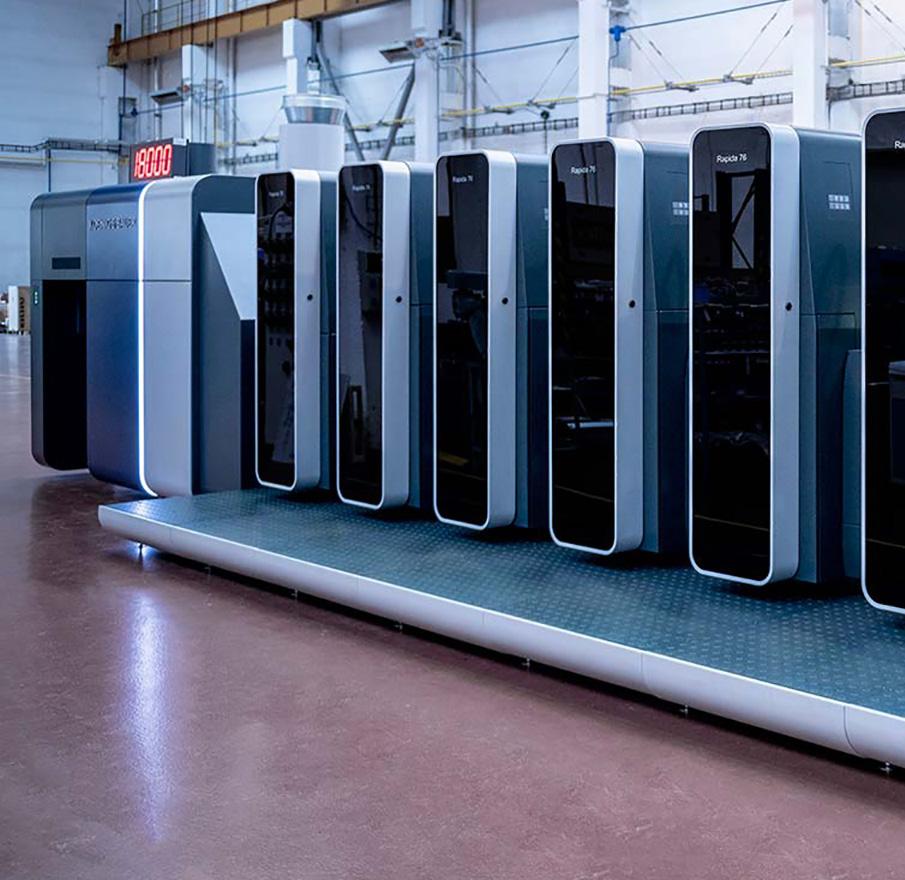
5 minute read
Large format and industrial print in Asia Pacific
A new generation of the Rapida 76 from Koenig & Bauer has just been released onto the market. The B2 press (standard sheet format 530 x 750 mm; special format 605 x 750 mm) impresses with its extraordinary level of automation, a minimal footprint and peak printing speeds of up to 18,000 sheets per hour.
Advertisement
Boasting a fully revamped and particularly aesthetic appearance, it also stands out visually from its predecessors, and presents itself in the new, award-winning Koenig & Bauer design.
New and proven automation functions characterise the Rapida 76 as an extremely efficient, high-performance sheetfed offset press. Key features are the DriveTronic dedicated drive components, which eliminate complicated gear systems and provide for both simple handling and parallel processes during job changeovers and make-ready.
The full preset capabilities of all press components are a further valuable benefit. In addition to the ErgoTronic console with wallscreen, the Rapida 76 possesses further decentralised touchscreens for maximum ease of operation. For users who are at home in the B2 format class, the Rapida 76 is an ideal means of production.
Broad diversity of configurations
To cater for as many different applications as possible, up to 11 printing and finishing units can be combined to configure a Rapida 76 which is tailored precisely to individual production needs. That could mean a ten-colour press with an automatically convertible perfecting unit for 5-over5 production – possibly together with an additional coating tower to allow the printing of covers, for example – or packaging presses with doublecoating facilities for the production of pharmaceutical packaging and the like. Further variants incorporate

In addition to blanket washing, the Rapida 76 possesses a conveniently accessible impression cylinder washing system
raised foundations to accommodate higher piles with board substrates, or various delivery extensions for coating applications. Ink duct dividers can also be chosen to enable rainbow printing.
Thanks to a comprehensive range of measuring systems and optional facilities for inline sheet inspection, the Rapida 76 is ideally prepared for a diversity of special applications, including even the production of security documents.
The half-format press is no less flexible when it comes to compatibility with different ink and coating systems. It handles both conventional and UV inks and coatings with equal ease. Beside IR/hot-air drying systems, various UV, HR-UV and LED-UV systems are also available.
Specialities “Made by Koenig & Bauer” As if that were not enough, the Rapida 76 offers further special features which benefit users in their daily work but are still far from commonplace in this format class:
as on all Rapida presses, inking units which are not required for a particular job can be disengaged from the press drive. This reduces roller wear and cuts

make-ready times. When production is to be resumed, the units concerned are re-engaged at the press of a button. The times in which plates had to be bent before loading onto the press are similarly over. On the Rapida 76, unbent plates can also be mounted, irrespective of whether an automated or simultaneous plate changing system is in use.
The ColorTronic ink ducts, with the bleed-free ink metering which is typical of all Rapidas, guarantee high repeat accuracy. This is achieved with individual ink keys and a special mechanical design which ensures that they are always set to the duct roller with an identical force. With this system, ink duct foils are rendered superfluous. Thanks to the EasyClean duct plate coating, extremely fast ink changes are possible nonetheless.
With simultaneous plate changing, all the plates on the Rapida 76 can be changed in just 45 seconds. In combination with CleanTronic Synchro, the blankets and impression cylinders – and optionally also the ink rollers – can be washed parallel to plate changing. This shortens make-ready times dramatically and leaves much more time for actual production. The same applies to automated coating forme changes.
Wide range of measuring and control systems
Application-orientated measuring and control systems contribute to faster make-ready, reduced waste, and a consistently high and stable print quality. The Rapida 76 can be configured with systems for register measurement and control, colour control and sheet inspection. All inline systems operate with a common remote maintenance engineers and
camera, which reduces maintenance requirements and simplifies handling.
In a full-featured setup, ErgoTronic ICR controls the register by way of a single sheet placed on the console, while QualiTronic ColorControl provides for convenient colour adjustment. The camera system installed after the last printing or coating unit or after the last unit before perfecting automatically determines the optical densities and controls the ink keys without further the manufacturer have access to an identical information database,
intervention. As an option, the system can be expanded to implement colour control according to grey balance (QualiTronic InstrumentFlight).
QualiTronic PDFCheck carries out inspection of the printed sheets and as the basis for uncompromising quality.
Digital services at the press of a button
A multitude of digital services surrounding the Rapida 76 helps to reduce unplanned downtimes, facilitates convenient and barrier-free maintenance of the press, and permits anonymous comparisons of important performance parameters with other presses in identical configurations.
The options range from PressCall for optimisation of communication with VisualPressSupport to enable a better description of the reason for a remote maintenance call using photos (with extensive commenting functions), texts, videos and audio, via Performance Reports and Press Inspection Reports, through to the first instances of predictive services based on methods of artificial intelligence.
In this context, the Customer Community is a central point of contact bringing all service offers together under one roof. Users and comparison with the customer’s PDF
meaning that they are all on the same page when working together.











